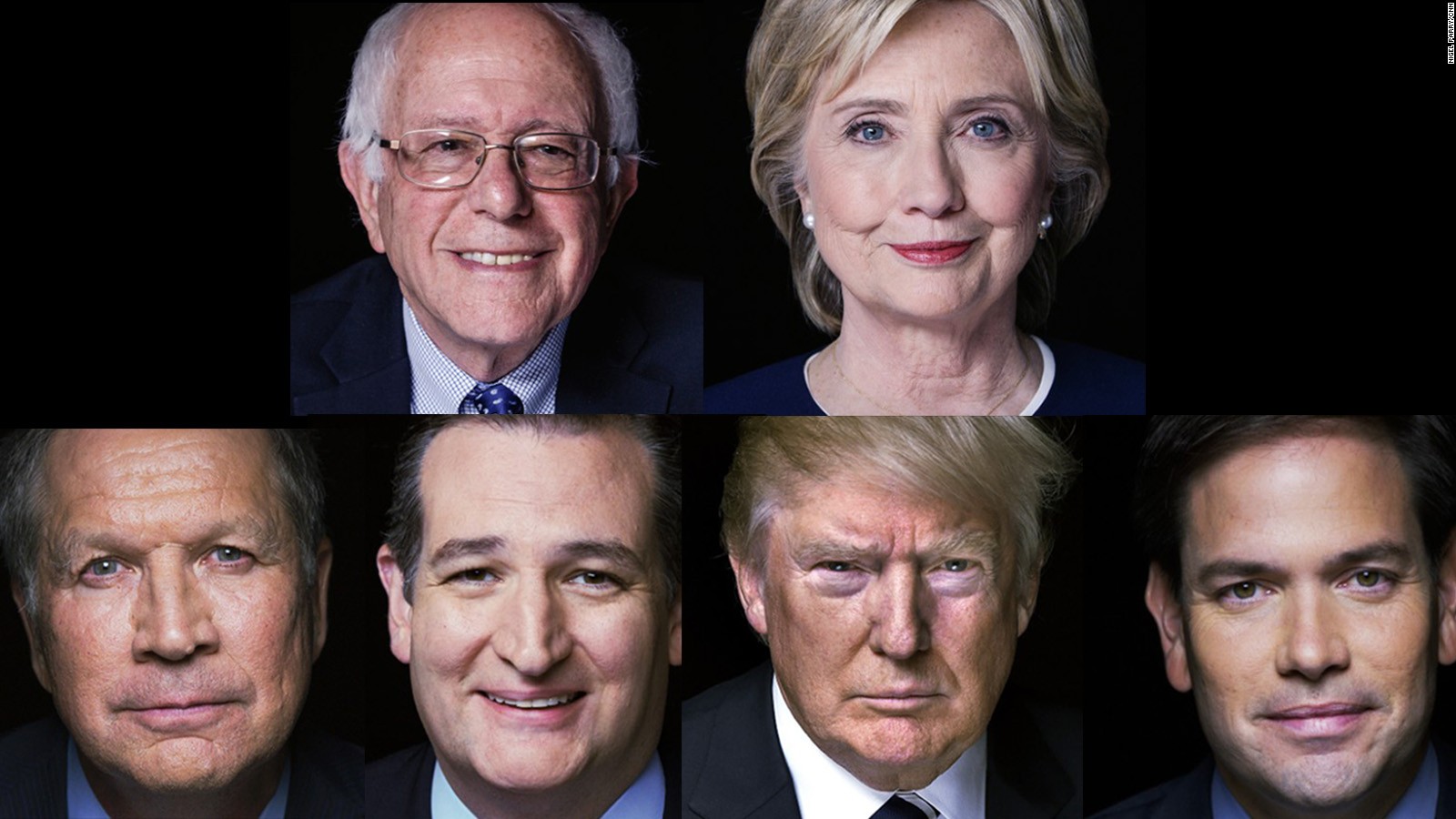Tuesday, March 15, 2016
Why this day changes everything for G
(CNN)The moment that many Republicans thought -- even hoped -- was impossible is now upon us: By Tuesday's end, Donald Trump could become the de facto presidential nominee of their party. Whether he does will largely come down to the will of voters in two states: Ohio and Florida.
Based on the most recent polls, a Trump victory appears to be a tossup in Ohio but a shoo-in for Florida, where he leads by high double digits. Every realistic scenario shows Trump building on his lead Tuesday, and perhaps extending it beyond the reach of his opponents entirely. The GOP's day of reckoning has come.
It's not just delegate math but campaign momentum that hangs in the balance. If Trump finishes first in the winner-take-all states of Ohio and Florida, he will be more than halfway to the 1,237 delegates he needs to lock up the GOP nomination. Just as importantly, he will have prevailed in two of the most essential swing states for the upcoming general election.
The narrative of Trump as the only legitimate nominee and best contender to beat Hillary Clinton(or Bernie Sanders) will become gospel among his supporters and increasingly difficult for his opponents to counter.
Donald Trump has gone from outsider to controversial front-runner in the race to become the Republican Party's 2016 presidential candidate. Trump began his bid with an announcement speech on June 16, calling for a massive wall on the U.S. border with Mexico -- for which he said he would make Mexico pay. At this stage he was tied for 10th place in the polls, at just 3%.
Even the rosiest scenarios for the anti-Trump forces now look pretty bleak over the long run. If Trump wins Florida but loses Ohio, he will maintain a substantial delegate lead with the likelihood of strong primary finishes in delegate-rich states such as New York, California and New Jersey ahead. And if he fails to win either Ohio or Florida, which is highly unlikely, he will still get enough delegates in other contests to remain in first place and face a fractured field of candidates going forward -- as Marco Rubio and John Kasich will be almost certain to stay in it if they have big hometown wins.
This is the painful reality for the GOP establishment: No matter what the outcome of Tuesday's winner-take-all primaries, it already has no good options to stop The Donald. Every other candidate's pathway to victory looks long and ugly. And even if Kasich manages to hold his home turf in Ohio, Rubio pulls out a miracle in Florida and Sen. Ted Cruz has strong finishes in Missouri, Illinois and North Carolina, the strategies to stop Trump are long shots at best.
For those conservatives, libertarians and mainstream Republicans who refuse to give in and want to beat Trump, there are really only two options left, and neither will be easy:
1. The anti-Trump war of attrition: In this scenario, Rubio, Cruz and Kasich stay in, regardless of their March 15 showings, and all throw their efforts into preventing Trump from getting to the magic 1,237 number. With Rubio reportedly telling his supporters to vote for Kasich in Ohio to prevent a Trump victory there, some elements of this strategy already appear to be in play.
Trump's opponents would continue to work in concert to deny him a majority, and the whole contest would drag on into the summer, consuming resources while the Democratic nominee focuses on fund-raising and general election campaigning.
Eventually, this approach lands the GOP at a brokered convention in Cleveland in July. At that point, as the theory goes, rule changes, political horse-trading and backroom machinations could pull the nomination away from Trump the front-runner and hand it to one of his rivals, or even some outsider brought in by the GOP elites.
Politically speaking, such moves would be burning down the village to save it. They may preserve the GOP's brand for the next go-round, but in the short run, they would almost certainly hand the White House to the Democrats. Trump's supporters would see such convention collusion as yet another betrayal at the hands of the very GOP overlords against whom they have revolted.
Whether Trump at that point went "third party," or his supporters merely stayed home in November, the end result would be the same: Clinton or Sanders at 1600 Pennsylvania Ave.
2. The Cruz miracle: The senator from Texas has been the only candidate to beat Trump in head-to-head competition in numerous states with substantial delegates in play. Other contests looming ahead, such as Arizona and Utah, look strong for Cruz. And in national polling, head-to-head, Cruz beats Trump by a wide margin. Cruz can win in a fair fight against Trump, but he has to get there first.
The problem Cruz has to overcome is a still too-crowded field and a campaign clock that is quickly running out. He needs Rubio and Kasich to clear the way and allow for the GOP contest to become a two-man race, and soon. The only way that happens is if Rubio loses, and somehow Kasich is convinced that, no matter what happens in Ohio, he has no realistic shot at the nomination. And keep in mind, with a win in Florida adding wind into his campaign's sails, Trump would be even harder for Cruz to catch.
The GOP campaign won't officially be over by Wednesday morning, and in a political season that has made a mockery of the conventional wisdom, anything seems possible. But if Trump racks up a few more big wins Tuesday, the nomination battle could be as good as over, and the GOP better get ready for a new kind of March Madness.

11 photos: Trump campaign: 11 outrageous quotes
On October 5, Donald Trump said there would be a "collapse" and "depression" in television ratings if he ended his presidential campaign. Later Trump suggested he would skip a CNN debate unless the network gave him $5 million. CNN refused, and Trump later backtracked.
Hide Caption
6 of 11

11 photos: Trump campaign: 11 outrageous quotes
On November 22, Trump repeated his claim -- widely regarded as false -- that he saw television reports of Muslims in New Jersey celebrating the 9/11 terrorist attacks. No footage to back up Trump's assertions has been found.
Hide Caption
7 of 11

11 photos: Trump campaign: 11 outrageous quotes
In the wake of December's San Bernardino, California, shootings, Trump called for a travel ban on all Muslimsfrom entering the United States "until our country's representatives can figure out what is going on." He did not give details on how Muslims would be identified, but the Republican candidate did not rule out special identification cards.
Hide Caption
8 of 11

11 photos: Trump campaign: 11 outrageous quotes
Donald Trump has developed an unlikely bromance with Russian President Vladimir Putin during the campaign. Trump had previously praised Putin as a leader he would "get along very well with." Then, on December 17, Putin further stoked the flame, describing Trump as "a bright and talented person." This led Trump in turn to make more positive comments about the Russian leader.
Hide Caption
9 of 11

11 photos: Trump campaign: 11 outrageous quotes
An unrelenting Trump took the run-up to Christmas as a chance to insult Democrat hopeful Hillary Clinton. He said Clinton's bathroom break in a TV debate was "disgusting" before saying she "got schlonged" by Barack Obama in the 2008 presidential race. "Schlong" is a Yiddish word for penis.
Hide Caption
10 of 11

11 photos: Trump campaign: 11 outrageous quotes
On January 24, Donald Trump boasted at a campaign rally in Sioux Center, Iowa, that support for his presidential campaign would not decline even if he shot someone in the middle of a crowded street.
Hide Caption
11 of 11






















0 comments:
Post a Comment